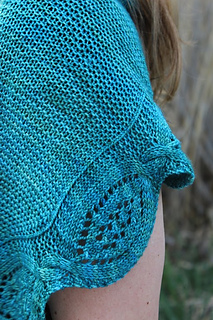patterns >  Katinka Designs
Katinka Designs
> Emmeline Wrap









Emmeline Wrap
I knit with wool year-round, but as we ease into spring and summer, my pattern interests change. I look for projects that I can easily tote around and work on while outside at a park, or when visiting with friends — things that keep my interest, but don’t demand intense concentration. And thus, the Emmeline Wrap…
Knit from tip-to-tip, the rows never grow too long to be tedious, and once blocked, the stitch pattern creates pretty, undulating waves. The garter stitch body shows off the nuances of color in a beautiful hand-dyed yarn, while the intertwining cables and lace of the border provide a little entertainment. Perfect warm-weather knitting!
This pattern contains both fully charted and written instructions. For charted only, print pages 1-6 and 11. For written only, print pages 1 and 7-11.
Recommended Yarn:
Marianated Yarns Scrumptious HT-150, one skein (80% superwash merino/ 10% cashmere /10% nylon; 600 yds / 549 m to 150 g). Shown in colorway Sea of Glass, and available in many other colorways at www.marianatedyarns.com. Sample shown used approximately 560 yds (515 m) of yarn.
Check out the results of the Emmeline KAL in the Marianated Yarns group!)
Sizing:
56” (142 cm) long and 14.5” (38 cm) deep—it was 64” (162 cm) long and 17” (43 cm) deep when pinned out to block. Length can easily be added to the straight section, but you will need approx. 15 g of yarn for each additional repeat. I used approximately 25 g for the Beginning and Increase Sections, 87 g for the Straight Section, and 24 g for the Decrease and Ending Sections.
Gauge:
19 sts and 30 rows to 4” in garter st, washed and blocked.
Needles:
US 6 (4 mm) needles, straight or circular.
PLEASE NOTE: I knit very tightly. I actually used a US 7 (4.5 mm) needle to achieve this gauge, but knitters who are typically “on gauge” will likely wish to use a US 6 (4 mm) needle. Very loose knitters will likely wish to use a US 5 (3.75 mm) needle. Changes in gauge will affect finished size and amount of yarn used.
Other Materials:
Cable needle, three stitch markers (thin ones recommended), tapestry needle, t-pins
Skills Needed:
m1R & m1L, k tbl & p tbl, cabling, single & double decreases
Many thanks to the lovely knitters who tested and looked over this pattern!
1227 projects
stashed
1284 times
- First published: May 2015
- Page created: May 1, 2015
- Last updated: January 5, 2020 …
- visits in the last 24 hours
- visitors right now




